A Brief Colonial History Of Ceylon(SriLanka)
Sri Lanka: One Island Two Nations
A Brief Colonial History Of Ceylon(SriLanka)
Sri Lanka: One Island Two Nations
(Full Story)
Search This Blog
Back to 500BC.
==========================
Thiranjala Weerasinghe sj.- One Island Two Nations
?????????????????????????????????????????????????Friday, October 2, 2020
A year after the October uprising, Iraqis have more reasons to protest
Iraq’s October uprising was a wake-up call for desperate generations caught in an endless cycle of poverty, marginalization and injustice. How does the struggle continue today?
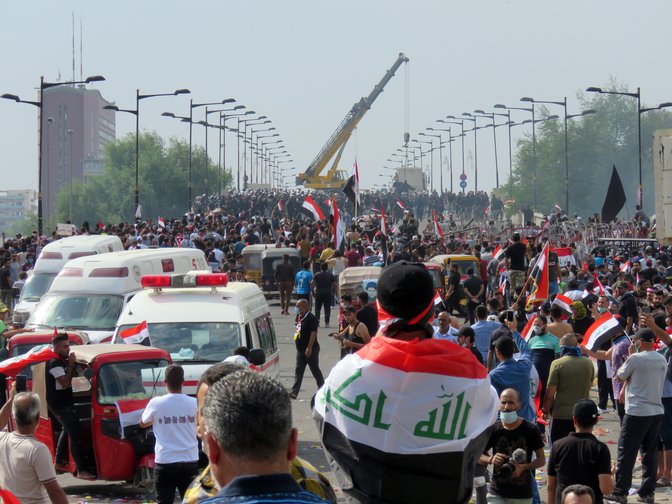 |
| mhuriya bridge attempt to push them back to Tahrir square during a protest in Baghdad, Iraq 25 October 2019| Picture by Nabil Salih. All rights reserved |
Nabil Salih-1 October 2020
“Iwish to give my life for Iraq and become a martyr,” he told me, smiling, sitting alone on the curb. Next to him was a tent set-up by volunteer medics, tending wounded protesters frantically shipped-in by knackered tuk-tuks throughout the evening. Instead of obsessing on his medical or engineering school application, the soot-covered thin boy who scored an average grade of 94 in high-school fled home to join flocks of livid youth at Baghdad’s Tahrir square, hell-bent on toppling the government.
This was a year ago, at the end of October 2019. It was a bloody night. No breeze blew from the Tigris. Tear gas, blended with sweat and smoke, swept away. The square buzzed with chants, music and shrieks of grief. On the neck of al-Jumhuriya bridge, state executioners deployed stun and gas grenades at the craniums of destitute youth with nothing in hand but the blood-stained tricolor of Iraq.
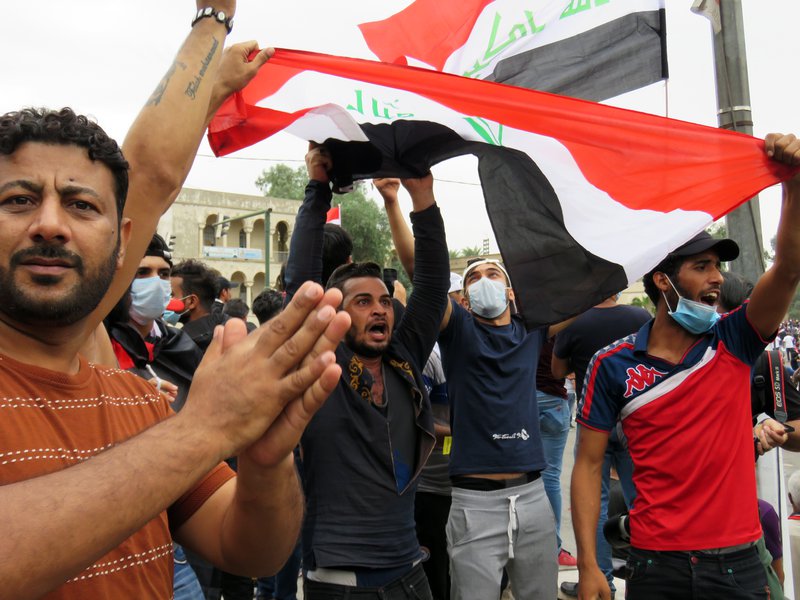
What happened to that boy?
In 2019, 725 Iraqis attempted suicide, according to the Iraqi High Commission for Human Rights. In taking their own lives, they escaped the misery of a life marred by myriad challenges – eventually pushing their anguished peers to protests. Little informed journalists who placed the unarmed protesters at the frontlines of “clashes” with security forces – joining state rhetoric in by portraying protesters as saboteurs – extolled a superficial stability under the rule of Adel Abdul Mahdi, the toppled prime minister who oversaw the bloody crackdown.
While they celebrated a partial access for civilian cars to the airport and blast walls coming down as achievements, not obligations, in downtown Baghdad, countless youth and child workers made living pushing handcarts through ramshackle alleys. Unemployed youth, widows and exploited children swarmed at Baghdad’s intersections like ants. They begged for alms, sold tissue packs or bottled drinking water. Meanwhile, in far-flung areas, remnant militants of Islamic State (IS) group continued to wage frequent attacks harming both civilians and security forces.
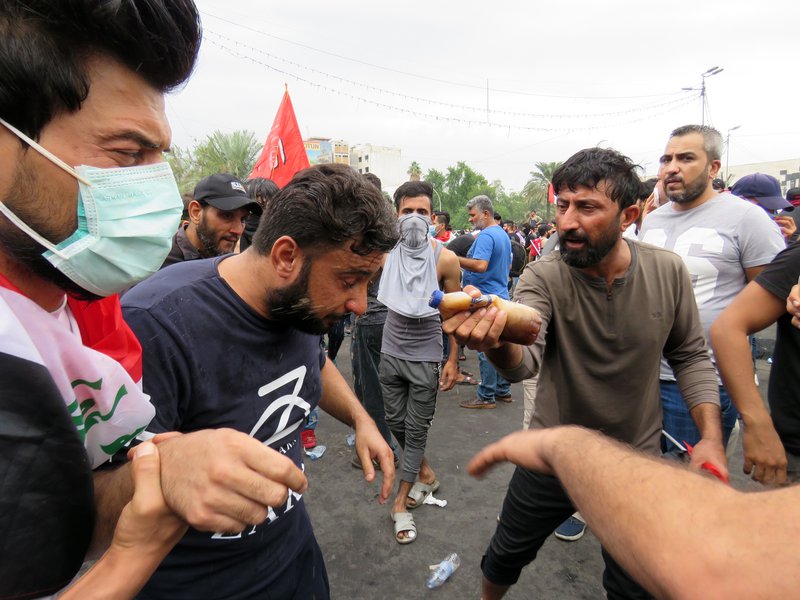
On the first day of October 2019, the downtrodden gathered on the streets of Baghdad to voice their rejection to the boots treading heavily on the faces of marginalized generations since 2003 – the year many of Iraq’s shipped-in democracy knights rode US tanks rolling into Baghdad to ‘liberate’ it.
The lack of basic services was merely one reason for igniting the anger harbored by millions. They rose to break the fetters of humiliation and injustice, to voice their refusal to the flogger whipping their backs for years.
Some were assassinated for covering the protests, others – myself included – were harmed and harassed while death threats reached many others
“We want a homeland!” they chanted. Live bullets, skull-smashing tear gas canisters and an incessant campaign of intimidation, kidnapping and assassination ensued. Journalists where not spared either. Some were assassinated for covering the protests, others – myself included – were harmed and harassed while death threats reached many others.
I spoke to victims of state repression receiving care at Médecins Sans Frontières’s hospital in Baghdad. Some with amputated limbs or shredded bones, breadwinners of their families no longer able to work. Despite their crippling injuries, none of them regretted participating in the protests.
The protests pushed Abdul Mahdi’s government to resign and stripped clerics of their red-line shields. But these were only two of many significant gains.
Despite the grave human cost, with hundreds of deaths and tens of thousands of injuries, the October Uprising was the beginning of change. It was a wake-up call for desperate generations caught in an endless cycle of poverty, marginalization and injustice to reclaim Iraq. It evidentiated the unity of Iraqis and refuted the divisions made-up and pushed by post-invasion politicians and their sectarian quota system - ‘Muhasasa’.
The movement was so pure and powerful that it left many politicians drooling, pitifully trying to appease the protesters in their statements. Even the US Secretary of State Mike Pompeo exploited the protests. He posted a video showing protesters in Baghdad celebrating the death of Iranian General Qasem Soleimani and deputy chief of Iraq’s Popular Mobilization Forces Abu Mahdi al-Muhandis in a US airstrike near the airport.
The protests pushed Abdul Mahdi’s government to resign and stripped clerics of their red-line shields. But these were only two of many significant gains
Yet, Pompeo – whose opportunism placed more danger on the protesters who were accused of receiving support from foreign embassies – seemed unaware that one of the most popular chants reverberating at protest squares slammed both Iran and the US intervention in Iraq: “Stooge, toady, to hell with Iran and the US!”
One year after
In the following months, Iraqis never really stopped protesting, albeit in subpar numbers. Today, there are calls to take to the streets in honor of those who sacrificed their lives for the Iraq they wished to see.
No wonder why. In recent weeks, at least ten Iraqis reportedly committed suicide. Among them a sixteen-year-old boy who hanged himself in al-Karradah neighborhood of Baghdad.
At daybreak, queues of young, unmasked day laborers line the sidewalks of Baghdad hoping someone would hire them. Those who afford to, have breakfast among stray dogs on traffic islands littered with garbage.
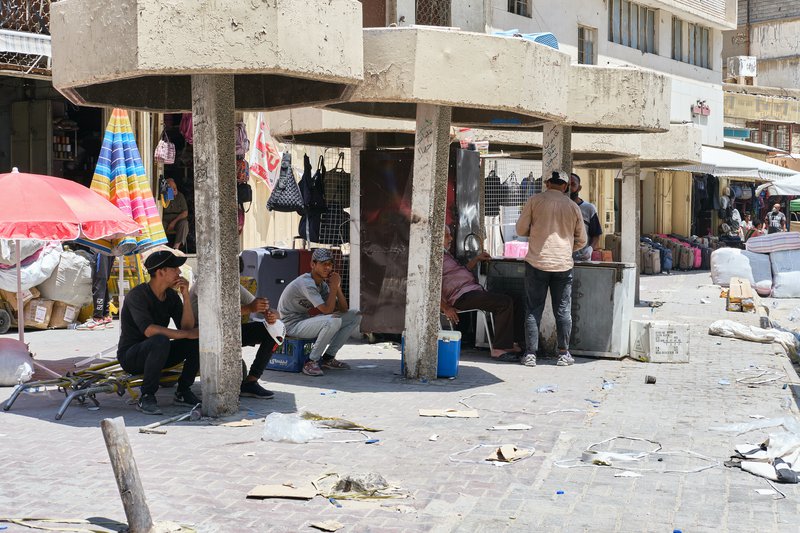 |
In recent weeks, at least ten Iraqis reportedly committed suicide. Among them a sixteen-year-old boy who hanged himself
In the evening, starved children roam main streets in flip-flops. They sell chewing gum, or wipe windshields of gleaming modern cars, gluing their faces to the windows in hope that the drivers would bother to forgo a few banknotes.
Meanwhile, unmasked customers file in flashy restaurants, where hardly any countermeasures to contain COVID-19 are in place. If any of them showed symptoms, private laboratories on al-Kindi street provide blood tests in secret for no more than $30 – away from the notoriously infected corridors of state hospitals.
Promises of justice and early elections
Iraq’s current premier, Mustafa al-Kadhimi – who ascended to power by agreements among the ruling elite and complete exclusion of Iraqis’ say in typical “democratic” fashion – promised to investigate the killing of protesters and hold early elections in June 2021.
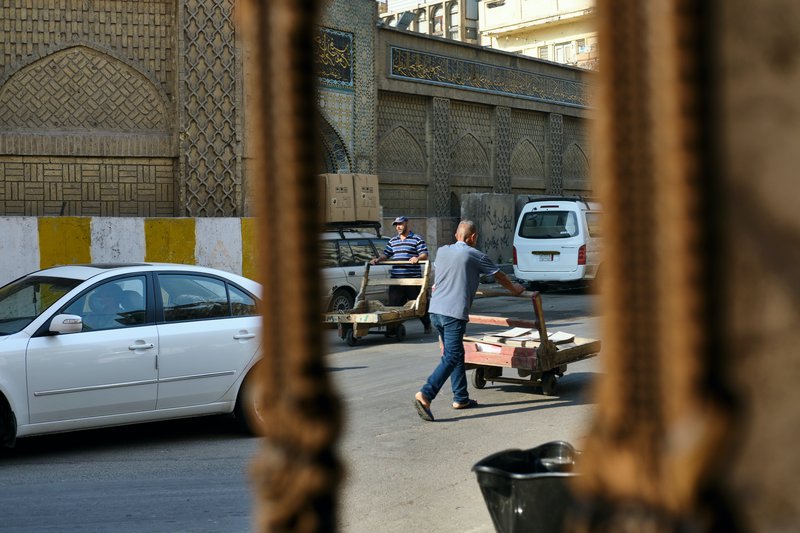 |
But Iraq’s ruling political blocs are stalling, irked that their access to state coffers and sway over decision making would lessen if elections take place according to an electoral law with multiple constituencies, where people cast their votes for individuals, rather than coalitions on provincial level. It remains unclear what form the law will take.
What’s certain is that parliamentarians are aiming to pass the notorious “cybercrimes law” which could be an instrument to silence critics of state failure by severe punishments ascending to execution.
In recent months, activists in Baghdad, Basra and Dhi-Qar were killed and kidnapped and the perpetrator remains “unknown”
In today’s Iraq, security breaches remain commonplace. It is a manifestation of lethal state failure.
In recent months, activists in Baghdad, Basra and Dhi-Qar were killed and kidnapped and the perpetrator remains “unknown”. To date, “unknown” armed groups continue to terrorize locals with frequent attacks on the US embassy, coalition camps, and logistic convoys. On 28 September 2020, two rockets landed in a residential area in western Baghdad, killing three children and two women.
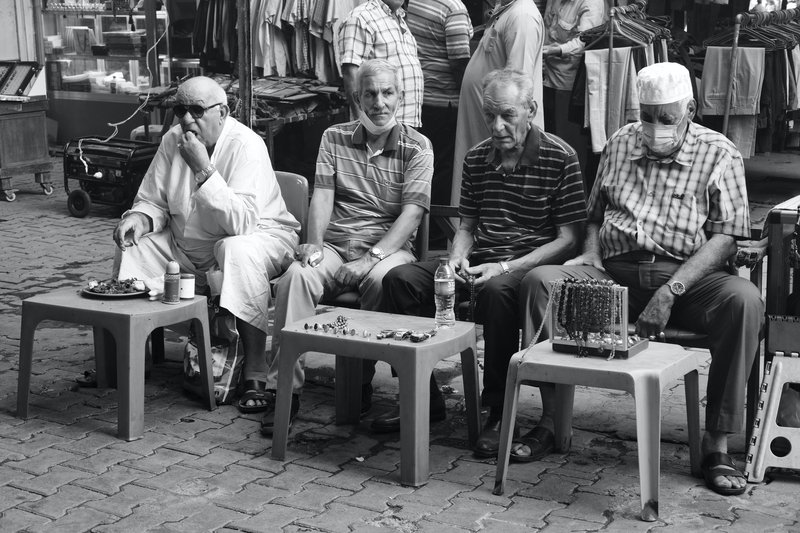 |
A few days earlier, al-Kadhimi endorsed a call by cleric Muqtada al-Sadr to form a committee charged with investigating breaches “targeting Iraq’s security, prestige, reputation and international commitments”. A move that seems logical, considering Sadr’s large follower base and Kadhimi’s alleged attempts to curb powerful outlaw groups.
The irony is that Sadr’s supporters have reportedly opened fire in February on protesters in southern Iraq. So how are Iraqis supposed to have faith in the current administration and the results of its probe into the killing of protesters?

